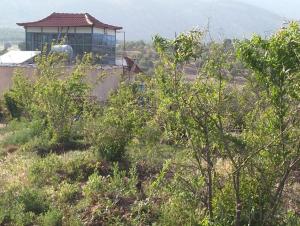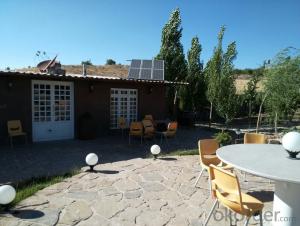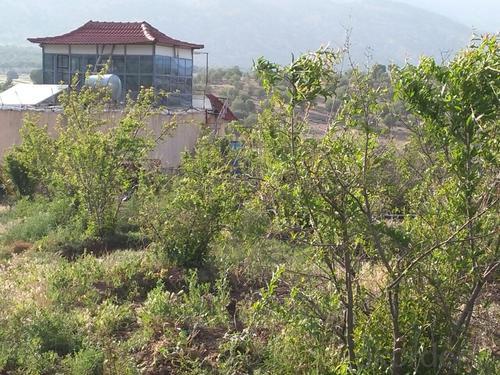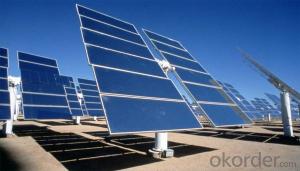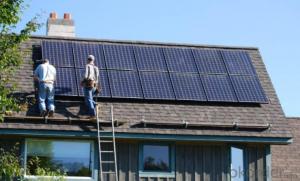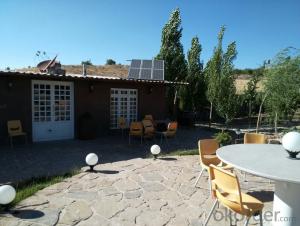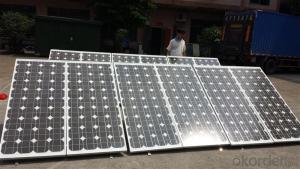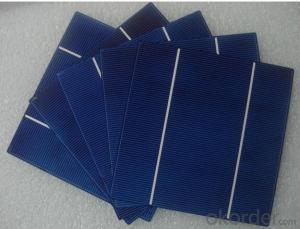Off-Grid Solar Power System 3KW High Efficiency
- Loading Port:
- China main port
- Payment Terms:
- TT OR LC
- Min Order Qty:
- 1 pc
- Supply Capability:
- 10000 pc/month
OKorder Service Pledge
OKorder Financial Service
You Might Also Like
1.Description of Product
Off-Grid Solar Power System is consisted of solar panel, solar charge controller, inverter, battery, mounting rack and cables.
(1).Grid-connected, send power to city grid
(2).MPPT technology, wide range of working voltage
(3).Simply Wiring, easy installation, customized design for your projects
(4).Low investment & long term feedback
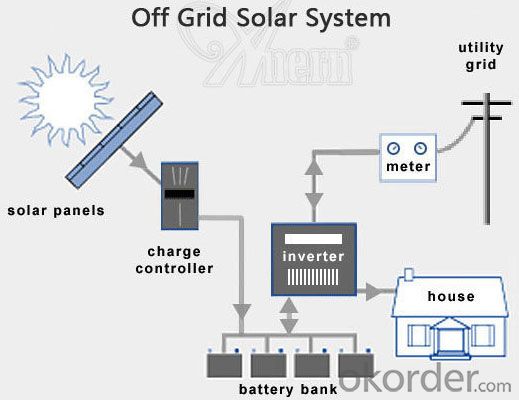
2. Off-Grid Features
1. Off grid solar power system is mainly used for application with relatively-small power consumption, and the areas have no grid network coverage, or grid power is unstable or outage condition.
2. It’s composed of solar panels, hybrid solar inverter, battery bank, solar panel mounting racks, and other accessories required fora complete home solar power system.
3. The battery bank gives a stable power output to the solar inverter which converts DC to AC to power loads, and provides power backup in rainy or cloudy days.
4. The solar panels generate electricity at daytime and charge the battery bank .
5. The off grid home solar power system provides grid power bypass in case of battery power shortage when sunshine is not enough.
6. All the off grid home solar power system configurations are worked out by scientific calculation and design.
The Product Parameter | |
Ref No. | 3KW |
Solar Panel | Type: Monocrystalline Silicon PV Module Max Power: 250W QTY:8 pcs |
Controller-Inverter Integrator | Rated Ouput Power: 3000W Rated DC Voltage: 48V QTY:1 pcs |
Battery | 12V/200AH per piece QTY:8 pcs |
Solar Panel Rack | Roof type mounting rack, anodized aluminum material, including complete fittings (Other type of racks can be customized as per client's requirement) QTY:1 pcs |
Cables | International standard, with specification suitable for solar system, BV1*10 QTY:60m |
3.The Pictures of Product
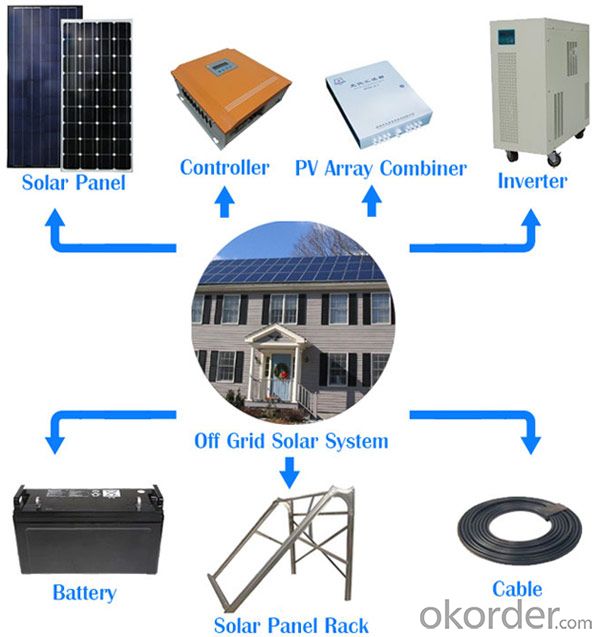
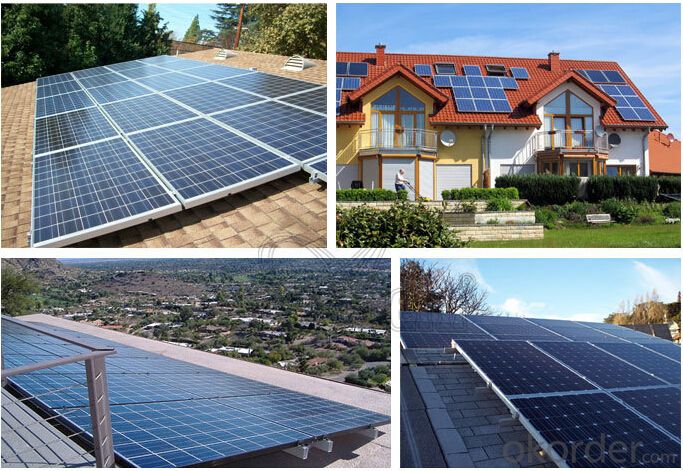
4.FAQ
Q1: What is the business type for the company?
A1: We are one of the biggest manufacturers inBejing.Chnia. Which is a high tech PV enterprise dedicated to the research, development, production and sales..
Q2: How long solar panel warranty can you offer?
A2: 10-Year product warranty,25-year linear power output warranty
If there is any quality problem, we will pay for freight and send free parts to you.
Q3: How many certificates do you have?
A3: We have 16 certificates,such as CE, TUV, UL, and so on.
Q4: Can I be the agent for you?
A4: Yes,We can discuss some information.
Q5: How to get a sample?How can cooperation with us
A5: contact us now.
- Q: How do solar energy systems impact the electricity transmission infrastructure?
- Solar energy systems have a significant impact on the electricity transmission infrastructure by reducing the overall demand for grid-supplied electricity. As more homes and businesses adopt solar power, the need for traditional power plants and transmission lines diminishes. This can result in lower transmission losses, decreased strain on the grid, and potential cost savings. However, it also presents challenges in terms of managing intermittent generation, integrating decentralized systems, and ensuring grid stability. Overall, solar energy systems are transforming the electricity transmission infrastructure towards a more sustainable and decentralized model.
- Q: Can solar panels be used to charge mobile devices?
- Yes, solar panels can be used to charge mobile devices.
- Q: Are there any government incentives or tax credits for installing solar energy systems?
- Yes, there are government incentives and tax credits available for installing solar energy systems. These incentives vary by country and region, but common examples include federal tax credits, grants, rebates, and feed-in tariffs. These incentives aim to promote the adoption of renewable energy sources, reduce greenhouse gas emissions, and stimulate economic growth in the solar industry. It is advisable to research and consult local government agencies or professional advisors to determine the specific incentives and credits available in your area.
- Q: Can solar energy systems be used in powering beauty salons or spas?
- Yes, solar energy systems can certainly be used to power beauty salons or spas. Solar panels can be installed on the roofs or other available spaces of these establishments to generate electricity from sunlight. This renewable energy source can then be used to power various equipment, lighting, heating, and cooling systems within the salon or spa. By utilizing solar energy, these businesses can reduce their reliance on the grid, lower their energy costs, and contribute to a more sustainable and environmentally-friendly operation.
- Q: What is the role of solar energy monitoring systems?
- Solar energy monitoring systems play a crucial role in tracking and analyzing the performance of solar power systems. They provide real-time data on energy production, consumption, and efficiency, helping to optimize energy usage, identify potential issues or malfunctions, and improve overall system performance. Additionally, these monitoring systems enable users to measure and verify the financial and environmental benefits of solar energy, ensuring that the system is operating at its maximum potential and delivering the expected return on investment.
- Q: Can solar energy systems be used in powering construction sites or temporary structures?
- Solar energy systems are certainly capable of powering construction sites or temporary structures. In fact, the utilization of solar power in these situations is growing due to its many advantages. To begin with, construction sites often lack access to conventional power sources, making solar energy a practical solution. Solar panels can be easily installed on rooftops, scaffolding, or even on the ground, providing a dependable source of electricity throughout the construction process. Moreover, solar energy systems offer flexibility in power generation. They can be tailored to meet the specific energy demands of construction sites, whether it be for powering tools, lighting, or charging equipment. This adaptability ensures that construction activities can proceed seamlessly without any disruptions. Additionally, solar energy systems are environmentally friendly. By harnessing energy from the sun, construction sites can significantly reduce their carbon footprint and contribute to sustainable practices. Solar power does not generate harmful emissions or noise pollution, which is particularly advantageous in urban areas or sensitive environments. Furthermore, solar energy systems provide long-term cost savings. Although the initial investment for installing solar panels might be higher compared to traditional generators, the ongoing operational costs are substantially lower. Construction sites can benefit from reduced fuel expenses, maintenance costs, and a reduced reliance on fossil fuels. It is worth noting that solar energy systems can also be utilized for temporary structures such as mobile offices, portable restrooms, or event venues. These structures can be conveniently powered using solar panels, eliminating the need for generators or grid connections. In conclusion, solar energy systems are a practical and sustainable choice for powering construction sites and temporary structures. They offer reliable, customizable, and cost-effective power solutions while minimizing the impact on the environment. As the global shift towards renewable energy continues, solar power is likely to become even more prevalent in the construction industry.
- Q: Can solar energy systems be used for heating water in commercial buildings?
- Yes, solar energy systems can be used for heating water in commercial buildings. Solar water heating systems utilize the sun's energy to heat water, which can then be used for various purposes like showers, dishwashing, and laundry in commercial settings. These systems are cost-effective, environmentally friendly, and can significantly reduce energy consumption.
- Q: Can solar panels be integrated into building materials like windows or roofing tiles?
- Yes, solar panels can be integrated into building materials such as windows or roofing tiles. This integration is known as building-integrated photovoltaics (BIPV), and it allows solar energy to be generated while seamlessly blending with the building's design. BIPV solutions are increasingly being used to enhance energy efficiency in buildings and promote sustainable practices.
- Q: Are there any limitations to the amount of electricity a solar energy system can generate?
- Yes, there are limitations to the amount of electricity a solar energy system can generate. These limitations include factors such as the size and efficiency of the system, the amount of sunlight available, and the geographical location of the system. Additionally, external factors like weather conditions and shading can affect the system's performance and limit its electricity generation.
- Q: How do solar energy systems impact community resilience?
- Solar energy systems can significantly enhance community resilience in various ways. Firstly, by reducing reliance on traditional energy sources, such as fossil fuels, solar energy systems help mitigate the impact of power outages and disruptions caused by natural disasters or other emergencies. This ensures that critical infrastructure, such as hospitals, emergency services, and communication networks, can continue to function during challenging times. Moreover, solar energy systems promote energy independence and self-sufficiency at the community level. By generating clean and renewable energy locally, communities can reduce their dependence on centralized power grids, making them less vulnerable to disruptions in the energy supply chain. This decentralized energy production also decreases the risk of cascading failures and enhances the overall stability of the energy system. Furthermore, solar energy systems contribute to the economic resilience of communities. They create jobs in the installation, maintenance, and manufacturing sectors, fostering local economic growth and reducing unemployment rates. Additionally, solar energy can lower energy costs for residents, businesses, and public institutions, freeing up resources that can be invested in other resilience-building initiatives. Overall, solar energy systems play a crucial role in enhancing community resilience by providing reliable and sustainable energy, reducing dependence on centralized grids, promoting economic growth, and mitigating the impact of climate-related disasters.
Send your message to us
Off-Grid Solar Power System 3KW High Efficiency
- Loading Port:
- China main port
- Payment Terms:
- TT OR LC
- Min Order Qty:
- 1 pc
- Supply Capability:
- 10000 pc/month
OKorder Service Pledge
OKorder Financial Service
Similar products
Hot products
Hot Searches
Related keywords
